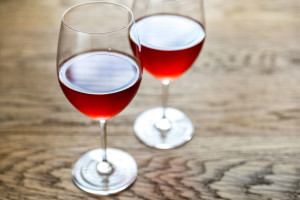Today we have a conference preview from Sharron McCarty, CSW. Sharron has been a top-rated presenter at many of our past conferences, so you don’t want to miss this session! Sharron tells us about the exploding popularity of rosé wines, and gives us a preview of her upcoming conference session!
I hope you can join us in Portland for Rosé, Brosé, Frosé!!! Rosé is a hot topic! Aaccording to a recent Nielsen poll (03/25/17), rosé is THE fastest growing wine segment, leading in both dollar volume growth (+47.3%) and case volume growth (+21.8%)!
Did you know that more men are ordering rosé at lunch than ever before? Lighter styled rosés are becoming the brosé of the wine world as more and more of our bro’s are enjoying them at lunch…suggesting you can drink a couple of glasses and still go back and finish the work day rather than falling asleep at your desk! Adding rosé to frozen (frosé’) cocktails has become quite popular too.
Rosés offer a wide spectrum of colors and styles from a variety of different grapes and regions, and range from bone dry to sweet. During our session, we will explore the many ways of producing rosé, including direct press and saignée, and look at the impact of the production method on the finished wine. Along the way, we’ll look at some of the most intriguing grapes in the world, and the wines they produce ranging in color from pale “onion skin” or “eye of the partridge” to almost purple.
While winemaker Nicolas Quille’ will not be able to participate in person, here are his comments on three of the sensuous rosé he produces at Pacific Rim—Unparalleled Provence Rosé, Rainstorm Oregon Pinot Noir Rosé, and Eufloria Washington Aromatic Rosé. They are quite different and reflect what Nicolas sees as the 3 main styles that knowledgeable consumers should have in mind when buying:
- Unparalleled Provence Rosé is a classic direct press rosé which means it is made from red grapes primarily that are pressed with minimal skin contact. The result is a lightly colored wine (onion skin to pale pink) that is fermented dry. This is the gold standard of high quality rosés in the world. Quille says he makes this wine with a family estate in the South of France because they know how to make a luxurious rosé and because it fits his Unparalleled line perfectly (marquee region, classic style & family estate relationship). As is common in the region, this is a blend of Grenache and Syrah (95% red grapes) with a touch of Rolle (aka Vermentino).
- Rainstorm Pinot Noir Rosé from Oregon is also a direct press wine with a touch (10% or so) of saignée juice. Saignée (bleeding) is a technique where the juice is put in contact with the skin for a short period of time (24 hours is common) in a tank and the colored juice is withdrawn out of the tank. Many view the saignée technique as less qualitative especially when it is a byproduct of red winemaking and when the winemaker attempts to lower the juice to skin ratio of his red fermenters (more skin and less juice resulting in concentrating the red wine). Rainstorm is a little deeper in color than Unparalleled from the saignée and more fruity (red fruit). This type of rosé is common in Burgundy and in Sancerre.
- Eufloria by Pacific Rim Rosé is a blend of aromatic white grapes (the four nobles of Alsace: Riesling, Muscat, Pinot Gris, and Gewurztraminer) that is “pinked” with a little red wine. The wine has a slight bit of residual sugar. The “pinking” method is common in the new world and in Champagne. This is a nice way to produce an aromatic rosé with a bright pink color.
The rosé craze is on, expanding beyond its seasonality—rose has become a mainstay…join us on the rose bandwagon to taste a broad selection of intriguing rosés from around the world (12 wines)!
Sharron’s session, “Rosé, Brosé, Frosé!” will be presented on Saturday 12, 2017, at 10:30 am as part of SWE’s 41st Annual Conference, to be held in Portland, Oregon.

